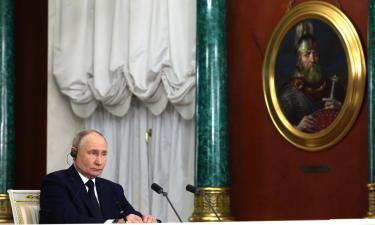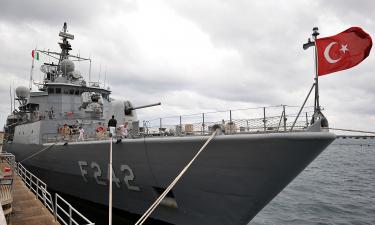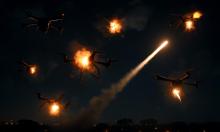Russia-U.S. round table: dialogue in progress
Russia and the United States have different basic values but largely common interests - this is the theme of utterances made by participants in the round table on the state of Russian-American relations. The Nezavisimaya Gazeta has arranged the round-table meeting.
In the opinion of the United States ambassador to Russia Alexander Vershbow, Moscow and Washington have developed a very good cooperation on virtually all international matters, such as anti-terrorism, non-proliferation of weapons of mass destruction, the settlement of regional conflicts. They interact also on a wide range of bilateral matters both on earth and in space.
If differences do emerge, they are rather of a tactical than strategic nature. True, economic relations are not developing as fast as they should but, overall, in the right direction.
For justice's sake, the basis of American-Russian relations still remains not as powerful and fundamental as the two sides would like it to be.
President Putin has got a mighty second-presidency mandate. His programme is ample and far-reaching and Washington would like to use any opportunity to go on with the strengthening of cooperation between the United States and Russia, Mr.Vershbow said.
Sergei Karaganov, chairman of the presidium of the External and Defence Policy Council, voiced the opinion that last and this year Russian-American relations have avoided the looming danger of Russia's gloating over what is going on in Iraq. It is enough to see any European television transmission and compare it with what Russian television shows from Iraq. "We do not show during five minutes corpses and burning cities, though we do not support the American operation in Iraq", Karaganov stressed.
Russia is in a position to play the role of a partner of the U.S. in fighting terrorism, said Mikhail Margelov, deputy chairman of the Parliamentary Assembly of the Council of Europe and head of the international affairs committee at the upper chamber of the Russian parliament - the Federation Council. He believes that in union with Russia the U.S. will undertake definite modernization of the international law, in order to make a legitimate use of the modern methods of responding jointly to global threats.
But the matter is, senator Margelov pointed out, that "the question of the role and place of Russia remains open to the present U.S. Administration." The purpose of cooperation is that the U.S. and Russia would understand what serves as a foundation for their interaction. If their interests are indeed significant, than it is time finally to formulate the status of their relations.
According to Igor Neverov, director of the North America Department at Russia's Foreign Ministry, in recent years relations with the U.S. have been progressing. "From the practical point of view, we try to act so that even organizational pauses would not appear in our dialogue. At present active bilateral contacts are maintained and an intensive schedule has been drawn up for the whole year." The processes going on in the economic relations between the two countries are definitely not deep enough, but the main thing is that now their economies have become more compatible, and the task is to make them mutually complementary. The U.S. is in the lead in the total amount of direct investments made in Russia, while Russian businessmen are beginning to invest in the U.S.
Lilia Shevtsova, a leading expert at the Moscow Carnegie Center, said that a year ago relations between Moscow and Washington appeared to be better than they were between Washington and Paris. This fact shows that countries with different systems of values may sometimes maintain more businesslike contacts than countries that are in the same system. There is experience and mutual understanding on the level of diplomatic channels, which make Russian-American relations work like "a well-oiled and effectively functioning mechanism." It has acquired its own logic of moving ahead, whatever may happen in both countries.
The question popular in the West is: how can Russia be influenced, so that it would move closer to the Western systems? Unfortunately, the West, the U.S. in the first place, is experimenting mainly with two variants of influencing Russia. It tries either to bring pressure to bear on Russia, threatening to punish it for bad conduct or to teach Russia lessons of democracy. It looks like both variants have exhausted themselves. Moreover, they have proved unproductive.
Subscribe to Pravda.Ru Telegram channel, Facebook, RSS!




